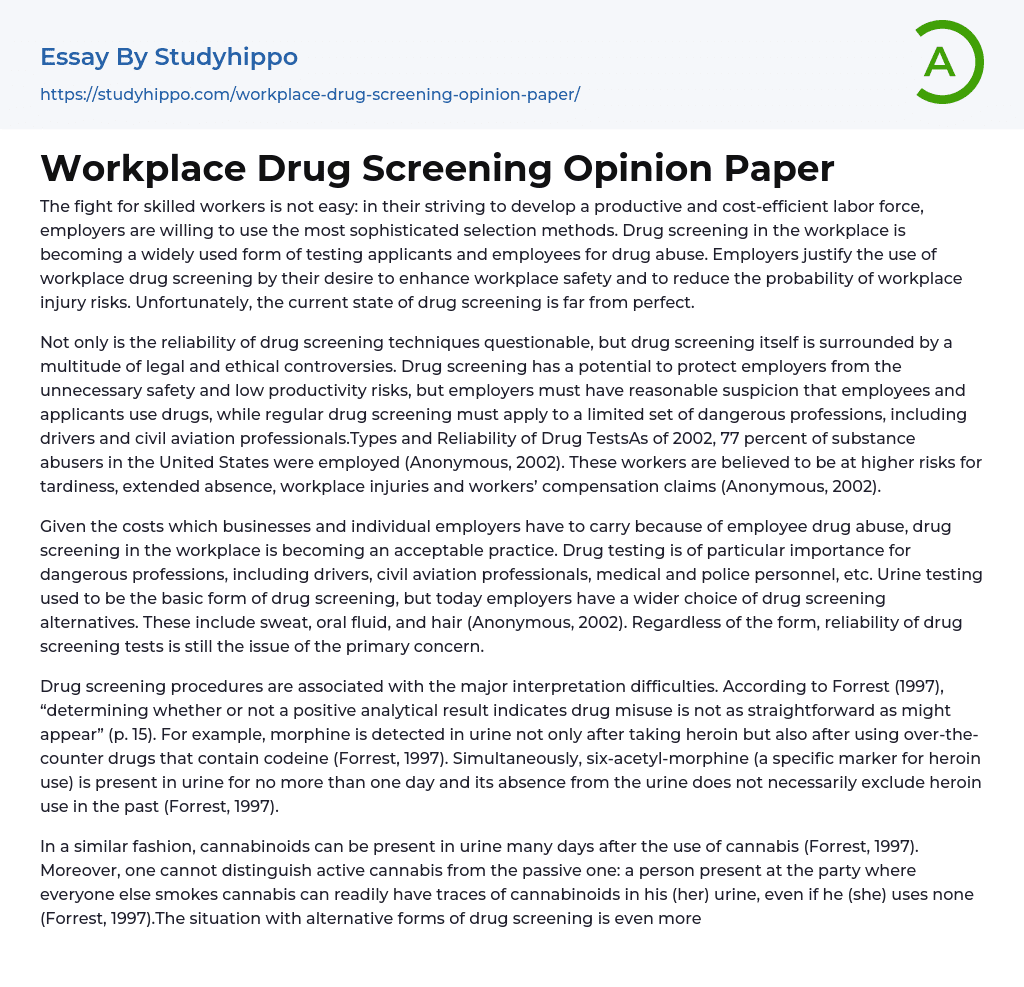Employers face difficulties in building a competent and cost-effective workforce due to the competition for skilled personnel. To achieve this, they adopt elaborate selection methods, including drug testing of job applicants and employees to detect substance abuse. The rationale behind workplace drug screening is to enhance safety and minimize work-related accidents risks. Nonetheless, the current state of drug screening is not without faults.
The use of drug screening techniques is surrounded by legal and ethical controversies due to questionable reliability. While drug screening has the potential to protect employers from safety and productivity risks, it can only be conducted if there is reasonable suspicion of drug use among employees and applicants. Regular drug screening is limited to certain dangerous professions like drivers and civil aviation professionals. As of 2002, 77% of substance abusers in the United States were e
...mployed, putting them at higher risk for workplace issues such as tardiness, extended absence, workplace injuries, and workers' compensation claims.
Drug screening in the workplace is becoming an acceptable practice due to the costs businesses and individual employers bear due to employee drug abuse. Drug testing is particularly crucial for hazardous professions like drivers, civil aviation professionals, medical and police personnel. While urine testing used to be the primary form of drug screening, employers now have various alternatives, including sweat, oral fluid, and hair (Anonymous, 2002). However, the reliability of drug screening tests continues to be a significant concern regardless of the chosen method.
Understanding drug screening results can be challenging, as a positive outcome does not always indicate substance abuse. For instance, morphine can show up in urine due to both heroin use and the consumption of
over-the-counter codeine medication. Additionally, the presence of six-acetyl-morphine, which is a unique indicator of heroin use, may not definitively confirm prior drug usage as it is temporary (Forrest, 1997).
According to Forrest (1997), detecting cannabinoids in urine after cannabis use can last for several days, and distinguishing between active and passive exposure is impossible. Even those who do not use cannabis may have traces of cannabinoids in their urine after being around others smoking the drug. Burlington (1998) notes that hair testing presents additional difficulties. It is uncertain how much drug exposure is needed to detect measurable levels in hair, and environmental exposure may also impact results. Moreover, the same test markers or reagents may react differently with different hair types and ethnic groups.
To ensure reliability, drug screening tests must meet three main criteria: (a) FDA approval and legalization, (b) dependable sample collection systems for nonprofessional settings, and (c) safe and secure systems to prevent mix-ups and ensure proper labeling of all samples (Burlington, 1998). Despite meeting these criteria, workplace drug screening still raises significant legal and ethical concerns. Employers can implement various types of drug screening programs including pre-employment testing for job applicants, random testing that catches employees off guard on test day, periodic testing at intervals throughout employment, or voluntary testing without job decision consequences (MacDonald, Wells & Fry, 1993). Random and periodic tests are typically used in high-risk professions like driving or medicine.
Employers may choose between voluntary and mandatory drug testing in the workplace to improve safety and productivity. Nevertheless, it is crucial to assess the legal and ethical consequences of implementing mandatory screening. This approach could infringe on constitutional rights like privacy
protection under the Fourth Amendment, affecting both current and potential employees' reasonable expectation of privacy. Employers must base their suspicions of employee drug abuse on objective facts and reasonable inferences drawn from them.
According to Bible (1988), drug screening in the workplace can impede with the right to privacy. The ethical implications of drug testing in the workplace are complex and multifaceted, encompassing privacy, autonomy, conflicts of interest, and intrusiveness. MacDonald, Wells, and Fry (1993) note that observing the process of urination during urine testing procedures is particularly problematic. In light of the difficulty in resolving both the ethical and legal issues of drug screening in the workplace, employers should refrain from randomly testing employees for drug abuse. Instead, drug screening should only occur when there is reasonable suspicion and for a limited set of high-risk professions that impact the safety of others, such as drivers and civil aviation professionals.
Drug screening is gaining acceptance as a way to reduce workplace injury, low productivity, and absenteeism. Employers have numerous screening options to choose from, including urine, hair, and sweat tests. However, there is limited research on the reliability of drug screening and it remains a topic of ethical and legal debate.
Employers should refrain from conducting random drug screenings on employees, except for a few hazardous professions like drivers and civil aviation professionals where regular drug testing is necessary.
- Working Time essays
- Collective Bargaining essays
- Organizational Structure essays
- Organizational Culture essays
- Workstation essays
- Sweatshops essays
- Working capital essays
- Job Satisfaction essays
- Working Class essays
- Hard Work essays
- Workforce essays
- Corporate Culture essays
- American Dream essays
- Barriers To Entry essays
- Capitalism essays
- Central Bank essays
- Compensation essays
- Consumerism essays
- Economic Development essays
- Economic Growth essays
- Economic Inequality essays
- Economic System essays
- Economy essays
- Employment essays
- Export essays
- Finance essays
- Free Trade essays
- Gross Domestic Product essays
- Human Development essays
- Income Inequality essays
- Industry essays
- Inflation essays
- International Business essays
- International Trade essays
- Macroeconomics essays
- Materialism essays
- Max Weber essays
- Microeconomics essays
- Minimum Wage essays
- Monetary Policy essays
- Monopoly essays
- Pricing essays
- Profit essays
- Recession essays
- resources essays
- Taxation essays
- Trade essays
- Unemployment essays
- Warehouse essays
- World economy essays




